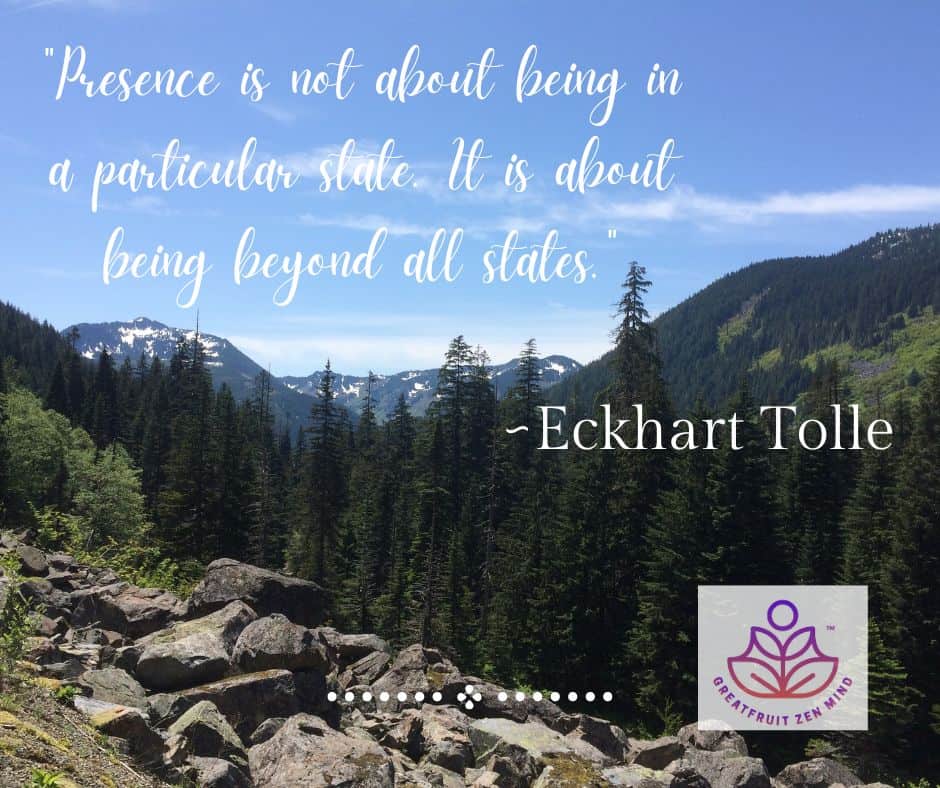Read time 4 minutes. Presence and Active Meditation is a stand alone article in our series regarding mindfulness and meditation.
In our last lesson we considered active meditations and their potential to lead us into deeper states of awareness. I suggested they can even open the door to Absolute Presence and Absolute Freedom. That is a bold claim, and perhaps a confusing one. What is the difference between presence and Absolute Presence? The answer lies in undoing a few common misconceptions about living in the now.
Presence is always available
The first mistake is believing that presence is something we must obtain. The moment we begin striving to get present, presence slips through our fingers. True presence is always here, already available. The very act of searching for it clouds our ability to see it.
Teachings on acceptance, allowing, and non-doing all point to this: striving is wasted effort. Presence is not seized; it is received. What we need is not more effort, but the proper positioning to notice what has never left.
This is why so many practices—whether breathing, awareness of the body, or other forms of active meditation—can serve as invitations. They lift the veil that blinds us from what is already in front of us. It may run against our instincts, but the path is not forward through grasping. It is simply removing what obscures.
Presence is timeless
The second mistake is tethering presence to time. We think of the present moment as a slice between past and future. But the instant we try to arrive at presence, we imply some future state. Presence cannot be reached that way.
Zen reminds us that presence is not a point on a timeline—it is timeless. Better to think of it as a field. Every step, every action already occurs within this field. We are never outside it. To be present is not to arrive, but to remember. It is waking up to what was never absent.
Let’s take a deeper dive into this David Hinton quote for just a moment. Perhaps it can help to further clarify these ideas. “…when a calligrapher first touches inked brush to a blank sheet of silk, it is that originary moment where Presence emerges from Absence. And as the brush stroke traces through its arcs and twists, it is always there at that originary moment, just like the awakened mind.” What is the meaning of this phrase, where Presence emerges from Absence?
Presence and Absence are not two things—they are the same. Presence is the experiential face of Absence, Tao entering form.
Absolute freedom
When people speak of presence, what they are really speaking of is freedom: the freedom to be okay in this moment. To realize that here, now, you have everything you need. In that realization the ego loosens, duality dissolves, and what remains is harmony with Tao itself.
Does this mean nothing ever goes wrong? Of course not. But when truly present, we are less entangled by the problems of the world and more able to meet them wisely.
Active meditations help here. They slow the restless interplay of imagination and emotion—the feedback loop that drags us into past and future. In the pause that remains, presence appears.
Honest introspection
How do we know if practice is working? By turning inward with sincerity. Ask yourself: does the idea that having enough now is abundance itself feel absurd, or does it spark a sense of relief? This kind of reflection is its own practice.
To taste even a moment of that truth is to glimpse freedom. Presence is not tied to outcomes. It is timeless, abundant, and always already here—waiting only to be remembered.
Explore more:
Somewhere between longer, traditional meditation sessions and active meditation lies the practice of focused, brief meditation sessions. These sorts of meditations amount to something of a timeout, wherein we take a moment to collect ourselves. Tara Brach offers a great example of a brief presence meditation along with a wide variety of other meditations as well.
–
Thanks for visiting Greatfruit Zen Mind.
Independent and ad-free. Help us stay that way. Add fuel or shop around.
🌀 From the GZM Archives – Polished, Preserved, Still Relevant.


Leave a Reply